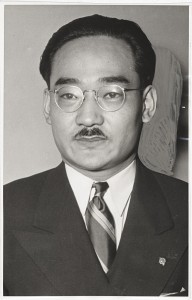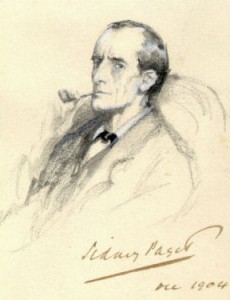 Japanese American storefront, 1942. Dorothea Lange
Japanese American storefront, 1942. Dorothea Lange
By Bob Hicks
In 1935 Sinclair Lewis published his novel It Can’t Happen Here, about the Hitler-style takeover of the United States by a power-grabbing populist president. The book’s title was satiric. Lewis meant that it very much could happen here, and if we didn’t pay attention, it just might.
On February 19, 1942, scant weeks after the Japanese aerial attack on Pearl Harbor, President Franklin D. Roosevelt signed Executive Order 9066, authorizing the rounding-up and “relocation” of Japanese American citizens, mostly from the Western states, into internment camps for the duration of World War II. More than 140,000 people, all of them uprooted from their ordinary lives, ended up in the camps.
 On March 28, 1942, little more than a month after the roundup had been set into motion, a young Japanese American man named Minoru Yasui — he’d been born on October 19, 1916, in Hood River, and earned his law degree from the University of Oregon in 1939 — walked into a police station in Portland and dared the officers to arrest him for breaking curfew. They obliged. Yasui landed in jail and eventually in a relocation camp. Yasui wanted to test the constitutionality of the internment law, and his case finally went to the United States Supreme Court, which ruled that his arrest and incarceration were legal. Yet he kept fighting, during and after the war. He was a Good Citizen.
On March 28, 1942, little more than a month after the roundup had been set into motion, a young Japanese American man named Minoru Yasui — he’d been born on October 19, 1916, in Hood River, and earned his law degree from the University of Oregon in 1939 — walked into a police station in Portland and dared the officers to arrest him for breaking curfew. They obliged. Yasui landed in jail and eventually in a relocation camp. Yasui wanted to test the constitutionality of the internment law, and his case finally went to the United States Supreme Court, which ruled that his arrest and incarceration were legal. Yet he kept fighting, during and after the war. He was a Good Citizen.
On Monday, March 28 — 69 years to the day after Yasui’s arrest — Artists Repertory Theatre will present a staged reading of Good Citizen, Portland writer George Taylor‘s play about Yasui’s good fight. The play, which is still getting a few revisions, is a finalist for the 2011 Oregon Book Awards. It’ll be performed at 7:30 p.m. on the theater’s Morrison Stage; tickets at the door only, suggested donation $8.
 All of this is an honor, and the awards ceremony is bound to be a lot of fun. But as writers tend to do, most of these people have already moved on to new projects. Acito is shifting his attention to New York and a new life in the world of Broadway musicals. Taylor’s had another play, The Strange Case of the Miser at Christmas, on stage for a first reading. And Dixon has just released his newest novel, The Ingram Interview, through
All of this is an honor, and the awards ceremony is bound to be a lot of fun. But as writers tend to do, most of these people have already moved on to new projects. Acito is shifting his attention to New York and a new life in the world of Broadway musicals. Taylor’s had another play, The Strange Case of the Miser at Christmas, on stage for a first reading. And Dixon has just released his newest novel, The Ingram Interview, through  Tonight we head to the Arlene Schnitzer Concert Hall, where the legendary
Tonight we head to the Arlene Schnitzer Concert Hall, where the legendary  Finally, Scatter regular
Finally, Scatter regular 

 Yes, charmed. And I thought, this is policymaking outside the channels of policy. Here, in Obama, is a man utterly at ease inside his own skin. That’s why people respond to him. Because he’s comfortable with himself.
Yes, charmed. And I thought, this is policymaking outside the channels of policy. Here, in Obama, is a man utterly at ease inside his own skin. That’s why people respond to him. Because he’s comfortable with himself.